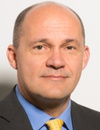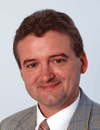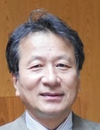Co-Located Conference Agendas2nd International Conference of the Flow Chemistry Society | ADME & Predictive Toxicology Europe | Chemistry Outsourcing | Formulation and Solubility | Fragment Based Lead Discovery | Structural & Computational Chemistry | 

Tuesday, 13 March 2012 |
Microfluidic Chemistry |
| | 09:00 |  | Keynote Presentation From Flow Chemistry in Vacuo to Supercritical Flow Reaction Environments
C. Oliver Kappe, Professor and Scientific Director, Center for Continuous Flow Synthesis and Processing, University of Graz, Austria
In this presentation the translation of flash vacuum pyrolysis protocols to solution-phase high-temperature/pressure flow reaction conditions will be presented, in many cases involving solvents in their supercritical state. |
| 09:30 | The Slow made Fast and the Dangerous made Safe: New Opportunities for Synthesis using Flow Chemistry
Thomas Wirth, Professor, Cardiff University, United Kingdom
The introduction of general platforms to perform reactions under continuous flow rather than in batch mode has led to improvements regarding safety and sustainability. A reduction in processing time and potential for manufacturing scale-out will be demonstrated using various examples. | 10:00 | Improving Organic Synthesis by Exploiting Flow Reactor Technology
Paul Watts, Distinguished Professor and Research Chair, Nelson Mandela University, South Africa
The application of flow reactors to efficiently optimise a range of different chemical reactions will be described. | 10:30 | Coffee and Networking in Exhibition Hall | 11:15 | The Regioselective Ring Opening of Epoxides with Sodium Azide in a Microreactor
Willem Verboom, Professor, University of Twente, Netherlands
The ring opening reaction of different types of epoxides with sodium azide to give vicinal azidoalcohols was investigated in a microreactor. The conversion and the regioselectivity strongly depend on the conditions used.
| 11:45 | Unusual Concepts for Microfluidic Chemical Applications
Holger Loewe, Professor, Johannes Gutenberg University Mainz, Germany
Since several years novel process windows are introduced for chemical (micro) flow processing. In combination with unusual concepts, e.g. processing in magnetic liquids, the use of MW under flow conditions to avoid hot-spots, or spray techniques, a push towards process intensification can be achieved additionally. | 12:15 | The Future of Ultrasound in Formulating Nanoscale Pharmaceuticals
Avi Schroeder, Researcher, Massachusetts Institute of Technology, United States of America
Ultrasound is used in many medical applications. Ultrasonic devices are constantly advancing, becoming smaller and more precise. Specifically, Adaptive Focused Acoustics (AFA) is being used to aid formulation processes at the bench or on large scale. AFA can be utilized to reduce the size of drug crystals in solution from the micro- to nano-scale under continuous or batch modes. | 12:45 | Lunch Break and Networking in Exhibition Hall | 13:30 | Poster Session | 15:15 | Coffee Break and Networking in Exhibition Hall | |
New Directions in Flow Chemistry |
| | 16:00 |  | Keynote Presentation Reaction Optimization in Flow
Neal Sach, Associate Research Fellow, Pfizer, United States of America
A flow technology is presented with the capability to run and analyze 100-300 reactions per day. The application of this technology to reaction optimization and library preparation is presented. |
| 16:30 | Self-Optimising Flow Reactors & Continuous Flow Chemistry in Supercritical CO2
Richard Bourne, Research Fellow, University of Nottingham, United Kingdom
This lecture will explore self-optimising continuous flow reactor systems utilising feedback control algorithms.
| 17:00 | Flow Chemistry under Ultrasound and Microwaves
Giancarlo Cravotto, Professor, University of Torino, Italy
Research laboratories and industries are involved in the search for new technology that may lead to process intensification. Our experience in flow reactors with ultrasound and microwaves confirmed the huge advantages of flow chemistry under non-conventional energy sources.
| 17:30 | Intensifying Processes with Miniaturized Devices
Jurgen Brandner, Professor, Karlsruhe Institute for Technology, Germany
The presentation will show advantages and draw backs of miniaturized equipment for process engineering. Starting with fundamental considerations, the focus will be set on design, manufacturing and heat transfer. Some examples of processes will be provided. | 18:00 | Drinks Reception |
Wednesday, 14 March 2012 |
Meso Flow Chemistry |
| | 09:00 |  | Keynote Presentation Advanced Process Chemistry for Micro Process Technology
Volker Hessel, Professor, Eindhoven University of Technology, Australia
The development of a process chemistry tailored to flow based on two pillars is described (Novel Process Windows) . The first explores unusual, harsh process conditions (chemical intensification; high-p,T,c). The second develops entirely new and much simpler process schemes (process-design intensification). |
| 09:30 | Flow Chemistry Routes – Realising the Possibilities
Ian Baxendale, Professor, Durham University, United Kingdom
This talk will focus on some of the advantages that can be realised using flow chemical processing illustrated using examples conducted in our laboratory.
| 10:00 | Synthesis of Heterocycles: From Microwave Batch Reactors to Mesoscale Production
Mark Bagley, Professor of Organic Chemistry, University Of Sussex, United Kingdom
| 10:30 | Coffee Break and Networking in Exhibition Hall | |
Lab to Pilot Scale |
| | 11:15 |  | Keynote Presentation Continuous Flow Microreactors for Efficiency in Organic Synthesis
Ilhyong Ryu, Professor, Osaka Prefecture University, Japan
Continuous microflow reactors are useful tools in preparing in the order of 10 to 100 grams of organic molecules. |
| 11:45 | Enabling and Optimizing Chemical Reactions in Real Time
Jon Goode, Technology and Applications Consultant, Mettler Toledo AutoChem Inc, United States of America
This presentation will focus on an overview of FTIR in situ analysis in industry, chemistry examples showing the rapid optimization of reactions using the combination of flow technology and in situ analysis, the potential for in situ FTIR technology to be used as a Process Analytical Technology (PAT) tool in Active Pharmaceutical Ingredient (API) production and finally ideas for the future of flow chemistry and in situ analysis. | 12:15 | Lunch Break and Networking in Exhibition Hall | 13:30 | Poster Session | 14:15 | Control of Hazardous Reactions in Continuous Flow / MicroReactors
Dominique Roberge, Group Leader, Lonza Group Ltd, Switzerland
| 14:45 | Improving Bio-Manufacturing Processes: Continuous Processing from Lab to Industrial Scale
Paul Dickson, Engineer, AM Technology, United Kingdom
| 15:15 | Coffee Break and Networking in Exhibition Hall | 16:00 | Heterogeneous Au(0)-catalysis Applied for Fine Chemical Synthesis in Flow
Alexander Gross, , Technische Universitat Ilmenau, Germany
The presentation will focus on flow-chemistry techniques which were applied for the formation and characterization of supported Au(0)-catalysts. Fluidic techniques were applied for both: the synthesis of colloidal nanoparticles for support impregnation as well as the kinetic- and reactive analysis of the received catalysts. | 16:30 | Novel Windows for Thermal and Light-induced Processes using Modular Micro Structured Reactors on Laboratory and Pilot Scale
Frank Schael, Head of Process R&D, Ehrfeld Mikrotechnik BTS Gmbh, Germany
| 17:00 | EKasic® Modular Continuous Flow Reactor Systems for Chemical Production Under Harsh Conditions
Lahbib Abahmane, Product Manager, ESK Ceramics, Germany
Welded Silicon carbide ceramic offers several advantages over conventional reactor materials. The presentation will focus on material properties, the kind of reactor modules, the operation range and some hazardous application examples. |
|


 Add to Calendar ▼2012-03-13 00:00:002012-03-14 00:00:00Europe/London2nd International Conference of the Flow Chemistry Society2nd International Conference of the Flow Chemistry Society in Munich, GermanyMunich, GermanySELECTBIOenquiries@selectbiosciences.com
Add to Calendar ▼2012-03-13 00:00:002012-03-14 00:00:00Europe/London2nd International Conference of the Flow Chemistry Society2nd International Conference of the Flow Chemistry Society in Munich, GermanyMunich, GermanySELECTBIOenquiries@selectbiosciences.com